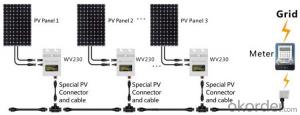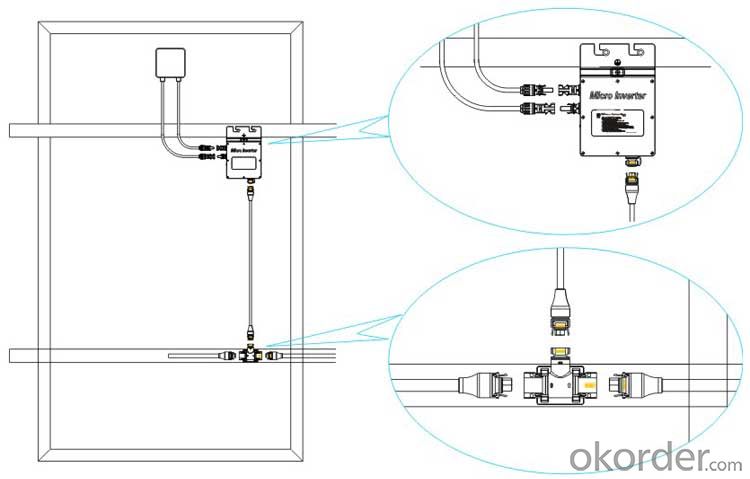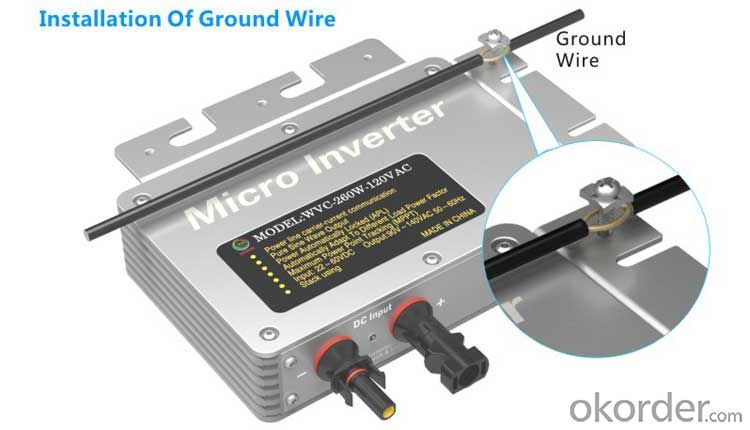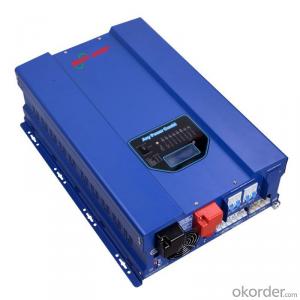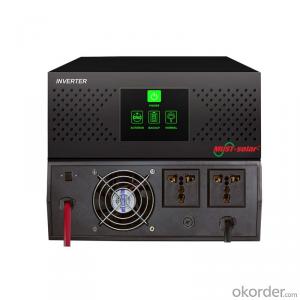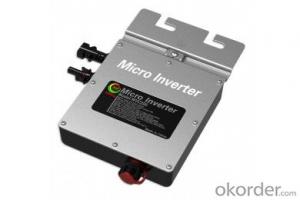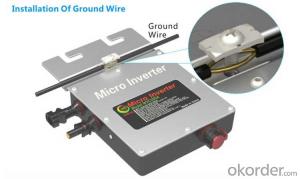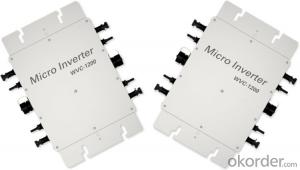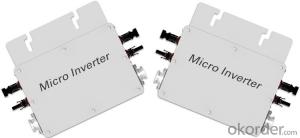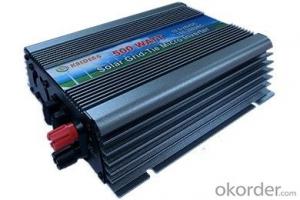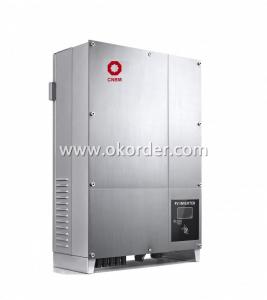KD-WV250 Series Solar Inverter Fuse - High Efficiency & Best Cost-Effectiveness
- Loading Port:
- China main port
- Payment Terms:
- TT OR LC
- Min Order Qty:
- 1000 pc
- Supply Capability:
- 100000 pc/month
OKorder Service Pledge
OKorder Financial Service
You Might Also Like
Structure
DC input voltage range:22-50VDC
AC output voltage range:80-160VAC/180-260VAC
AC output power :260Wp
AC frequency range:50Hz/60Hz
G.W.:0.85kg
Size:250mm*200mm*60mm
KD-WV250 Series Using IP65 waterproof streamline design, Can effectively prevent rainwater on the surface erosion, Built-in high-performance Maximum Power Point Tracking(MPPT)Function,Better able to track changes in the solar luminosity and control different output power, Effectively capture and collect sunlight. AC electric power transmission using the reverse transmission technology, Is one of our patented technology, The inverter output power can provide load priority use, Extra electricity to the grid, Efficient use of the inverter to the power emitted, Electricity transmission rate of up to 99%.
Features
Pure Sine Wave Output;
High performance Maximum Power Point Tracking(MPPT);
Power Automatically Locked(APL);
Reverse power transmission;
High-Frequency High Conversion Rate;
Anti-Islanding Protect;
Input /output is fully isolated to protect the electrical safety;
Multiple parallel stacking;
The Leading Patent Technology;
IP65 WaterProof;
Flexible Installation;
Simplify maintenance (user serviceable)
High Efficiency & Best Cost-Effectiveness
Images
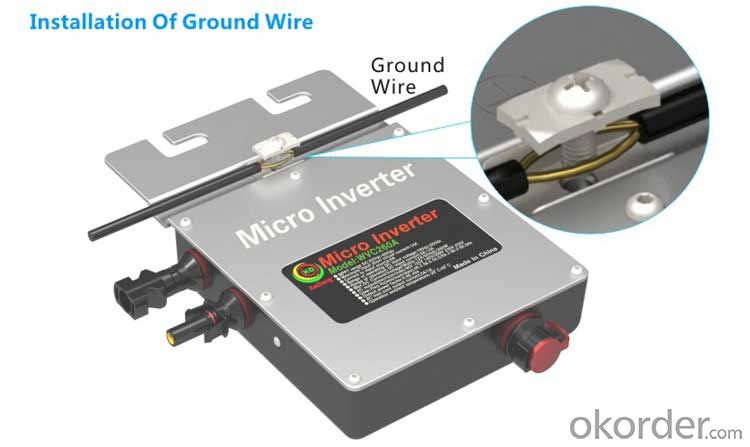
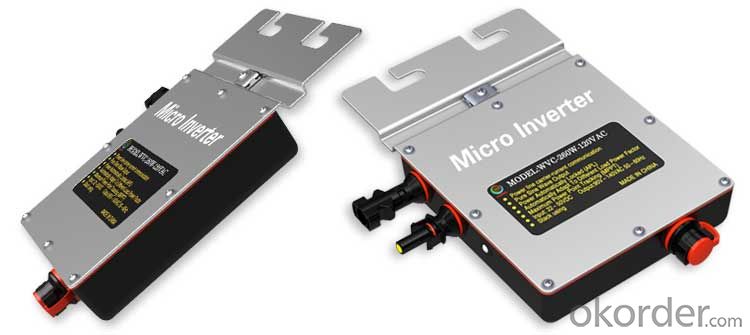
Specification
Input Data | KD-WV250-120VAC/230VAC | |||
Recommended input power | 200-300Watt | |||
Recommend the use of PV modules | 300W/Vmp>34V/Voc<50V | |||
Maximum input DC voltage | 50V | |||
Peak power tracking voltage | 25-40V | |||
Operating Voltage Range | 17-50V | |||
Min / Max start voltage | 22-50V | |||
Maximum DC short current | 15A | |||
Maximum Input Current | 9.8A | |||
Output Data | @120VAC | @230VAC | ||
Peak power output | 260Watt | 260Watt | ||
Rated output power | 250Watt | 250Watt | ||
Rated output current | 2.08A | 0.92A | ||
Rated voltage range | 80-160VAC | 180-260VAC | ||
Rated frequency range | 57-62.5Hz | 47-52.5Hz | ||
Power factor | >96% | >96% | ||
Maximum units per branch circuit | 15PCS(Single-phase) | 30PCS(Single-phase) | ||
Output Efficiency | @120VAC | @230VAC | ||
Static MPPT efficiency | 99.5% | 99.5% | ||
Maximum output efficiency | 92.3% | 94.6% | ||
The average efficiency | 91.2% | 93.1% | ||
Night time power consumption | <50mW Max | <70mW Max | ||
THDI | <5% | <5% | ||
Exterior | ||||
Ambient temperature | -40°C to +60°C | |||
Operating temperature range (inverter inside) | -40°C to +82°C | |||
Dimensions (WxHxD) | 191mm*1176mm*38mm | |||
Weight | 0.83kg | |||
Waterproof Rating | IP65 | |||
Cooling | Self-cooling | |||
Feature | ||||
Power transmission mode | Reverse transfer, load priority | |||
Electromagnetic compatibility | EN50081.part1EN50082.part1 | |||
Grid disturbance | EN61000-3-2 Safety EN62109 | |||
Grid detection | DIN VDE 1026 UL1741 | |||
Certificate | CEC,CE National patent technology | |||
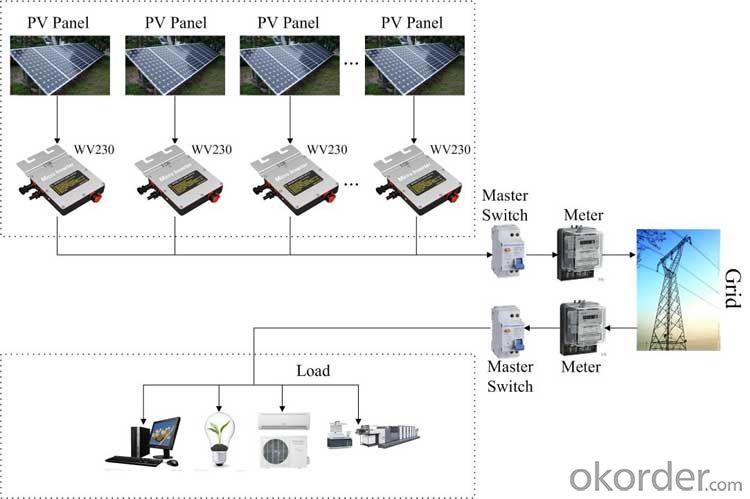
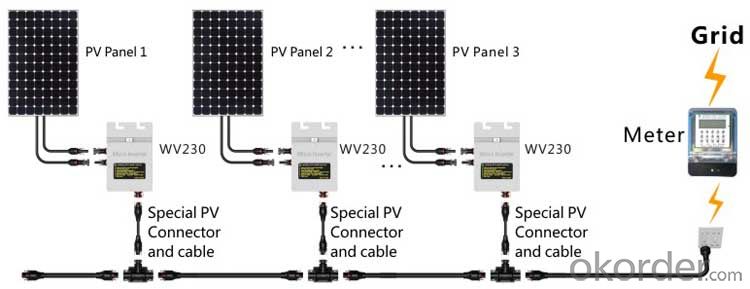
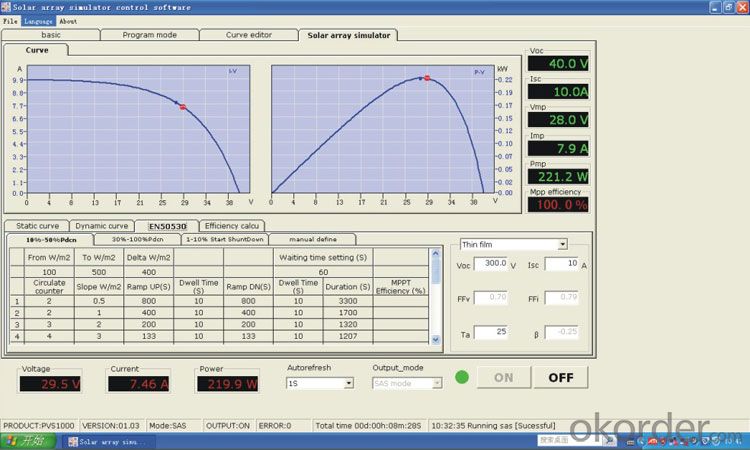
FAQ
Can we visit your factory?
Surely, I will arrange the trip basing on your business schedule.
Can you do OEM for us?
Yes, we can.
How do you pack your products?
We have rich experience on how to pack the panels to make sure the safety on shipment when it arrives at the destination.
Can you help us install the module if we cooperate with you?
We haven’t entered into installation sector, but we have the plan in near future.
- Q: Can a solar inverter be used in areas with high humidity and salt air exposure?
- Yes, a solar inverter can be used in areas with high humidity and salt air exposure. However, it is important to choose a solar inverter that is specifically designed for such conditions, as these factors can potentially impact the performance and lifespan of the inverter. It is advisable to consult with a professional to ensure the selection of a suitable solar inverter for areas with high humidity and salt air exposure.
- Q: Are there any noise emissions from a solar inverter?
- Yes, solar inverters generally produce some level of noise emissions. However, the noise generated by modern solar inverters is typically very low and often negligible. The noise is mainly caused by the cooling fans within the inverter, which are designed to keep the device cool during operation. Nonetheless, the noise level is usually not bothersome and should not significantly impact the surrounding environment or living spaces.
- Q: Can a solar inverter be used with concentrated solar power systems?
- Yes, a solar inverter can be used with concentrated solar power systems. Concentrated solar power systems use mirrors or lenses to concentrate sunlight onto a receiver, which then converts the solar energy into heat or electricity. The solar inverter is responsible for converting the DC (direct current) power generated by the concentrated solar power system into AC (alternating current) power that can be used to power appliances and feed into the electrical grid. Therefore, a solar inverter is an essential component in the integration of concentrated solar power systems into the electrical infrastructure.
- Q: Photovoltaic grid-connected inverter without DC emc how will happen
- When solar or other light illuminates the PN junction of the semiconductor, a voltage (called a photogenerated voltage) occurs on both sides of the PN junction. This phenomenon is the famous photovoltaic effect.
- Q: What is the role of an anti-islanding function in a solar inverter?
- The role of an anti-islanding function in a solar inverter is to ensure the safety of utility workers and prevent damage to the grid. It detects when there is a loss of connection to the grid and immediately shuts down the inverter, preventing it from continuing to supply power to the grid during a power outage. This is crucial because it prevents a potential dangerous situation called islanding, where the inverter continues to generate power and creates a false grid, posing risks to utility workers who may be working on the grid. By shutting down the inverter during an outage, the anti-islanding function helps maintain the stability and integrity of the electrical grid.
- Q: Are solar inverters compatible with different solar panel technologies?
- Yes, solar inverters are generally compatible with different solar panel technologies. However, it is important to ensure that the inverter's specifications and capabilities align with the specific requirements of the solar panels being used. Some inverters may be optimized for certain panel technologies, so it's advisable to consult with manufacturers or experts to ensure compatibility and maximize system efficiency.
- Q: Can a solar inverter be used with different types of solar tracking systems?
- Yes, a solar inverter can be used with different types of solar tracking systems. Solar inverters are designed to convert the direct current (DC) produced by solar panels into alternating current (AC) for use in homes or businesses. They are compatible with various solar tracking systems, including single-axis and dual-axis trackers, as long as the voltage and power ratings of the inverter match the requirements of the specific tracking system.
- Q: How does a solar inverter handle voltage sag and swell?
- A solar inverter handles voltage sag and swell by utilizing its power conditioning capabilities. When it detects a voltage sag (a temporary decrease in voltage), the inverter adjusts its internal control algorithms to provide a stable and consistent output voltage to the connected loads. Similarly, in the case of voltage swell (a temporary increase in voltage), the inverter modifies its operation to prevent overvoltage conditions and ensure a safe and regulated output. Through continuous monitoring and intelligent control, a solar inverter effectively manages voltage fluctuations to maintain stable power delivery.
- Q: Can a solar inverter be used with solar-powered emergency backup systems?
- Yes, a solar inverter can be used with solar-powered emergency backup systems. The solar inverter converts the direct current (DC) generated by the solar panels into alternating current (AC), which can be used to power various appliances and equipment during emergencies. This allows for the efficient utilization of solar energy stored in batteries to provide backup power when the grid is down.
- Q: Can a solar inverter be used in off-grid systems?
- Yes, a solar inverter can be used in off-grid systems. Off-grid systems rely on solar panels to generate electricity and store it in batteries for use when the sun is not shining. A solar inverter is necessary to convert the direct current (DC) produced by the solar panels into alternating current (AC) that is usable by common household appliances.
Send your message to us
KD-WV250 Series Solar Inverter Fuse - High Efficiency & Best Cost-Effectiveness
- Loading Port:
- China main port
- Payment Terms:
- TT OR LC
- Min Order Qty:
- 1000 pc
- Supply Capability:
- 100000 pc/month
OKorder Service Pledge
OKorder Financial Service
Similar products
Hot products
Hot Searches
Related keywords
